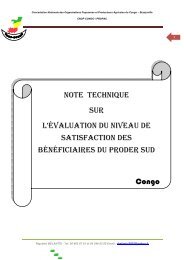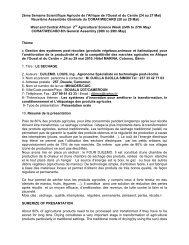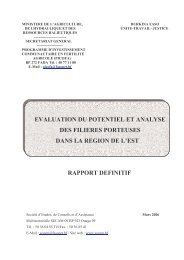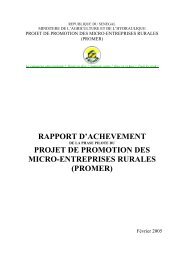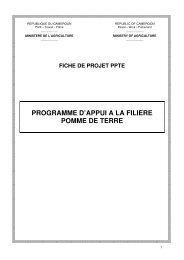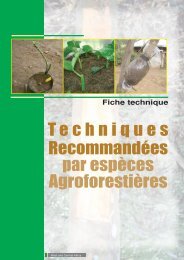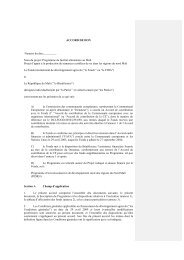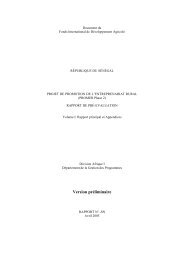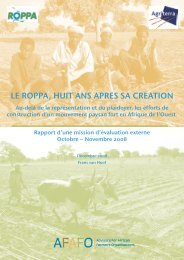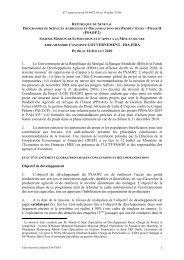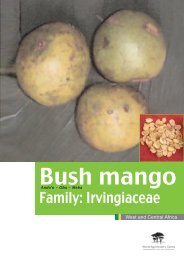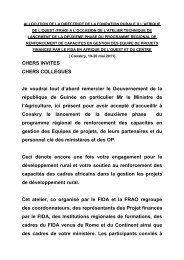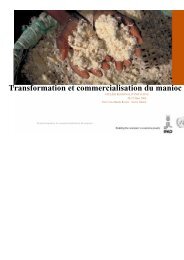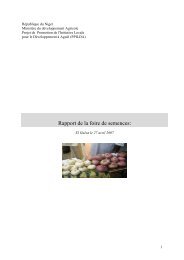Scaling Up the Fight Against Rural Poverty - FIDAfrique
Scaling Up the Fight Against Rural Poverty - FIDAfrique
Scaling Up the Fight Against Rural Poverty - FIDAfrique
You also want an ePaper? Increase the reach of your titles
YUMPU automatically turns print PDFs into web optimized ePapers that Google loves.
B. Knowledge management and scaling up<br />
In September 2007 IFAD published its Knowledge Management Strategy. The strategy recognizes that<br />
“[i]nnovation learning and scaling up toge<strong>the</strong>r form one of IFAD’s six principles of engagement,<br />
which apply to all IFAD’s country programmes: knowledge management is central to this agenda”; 39<br />
and that “[k]nowledge-sharing processes are vehicles for replicating and scaling up innovative<br />
solutions and integrating solutions in policies and guidelines.” 40 The strategy proposes a number of<br />
steps at all levels of <strong>the</strong> institution. However, <strong>the</strong>re is little specific indication of how <strong>the</strong> process of<br />
knowledge management will support <strong>the</strong> development and implementation of scaling up pathways.<br />
According to <strong>the</strong> ARRI 2009, knowledge management (KM) in IFAD has improved with <strong>the</strong><br />
implementation of <strong>the</strong> strategy. Our interviews and observation confirm that KM is playing a<br />
significant role in IFAD, including in its operational divisions. Some regional divisions have KM<br />
advisers; pursue KM initiatives; establish electronic knowledge sharing platforms linked to projects<br />
(e.g., in China); and publish learning notes, technical notes, occasional papers and newsletters, all<br />
designed to draw out innovative ideas, best practice and lessons learned. COSOPs have sections that<br />
deal with KM; <strong>the</strong> annual portfolio reviews are substantial monitoring and learning exercises at <strong>the</strong><br />
institutional level; and KM, especially as it relates to innovation, has been given considerable<br />
management attention.<br />
From <strong>the</strong> perspective of this review implementation of <strong>the</strong> strategy still faces a number of challenges<br />
which will need to be addressed, if IFAD’s KM activities are to provide effective support to its scaling<br />
up agenda:<br />
• <strong>the</strong> strategy and its implementation have yet to make a substantial difference to IFAD’s<br />
weakness in country analytical capacity, which we noted earlier;<br />
• it still has to address long-standing weaknesses in monitoring and evaluation of projects;<br />
• it does not address <strong>the</strong> over-load of CPMs, who are <strong>the</strong> lynchpin in <strong>the</strong> operational KM<br />
process, as potential providers, transmitters and recipients of knowledge, but who cannot<br />
play this role effectively simply for lack of time; and<br />
• it has yet to incorporate a substantive link between KM and scaling up .<br />
A particularly valuable contribution which IFAD’s KM could make is to improve <strong>the</strong> knowledge base<br />
of what scaling up experiences IFAD has actually had and what lessons can be learned from <strong>the</strong>se. In<br />
Chapter 3 we reviewed some of <strong>the</strong> readily available evidence. But with <strong>the</strong> exception of <strong>the</strong> two<br />
country case studies prepared for this review, <strong>the</strong> currently available information tells us very little<br />
about key aspects of <strong>the</strong> scaling up path of successfully scaled up programs. A specific<br />
recommendation <strong>the</strong>refore is to carry out a more in-depth review of <strong>the</strong> IFAD’s country and <strong>the</strong>matic<br />
programs in terms of can be learned about scaling up pathways. Based on <strong>the</strong> cumulative learning<br />
training of staff, consultants and borrower counterparts should be developed and provided as a way to<br />
share <strong>the</strong> knowledge effectively on a broad basis. Expanded and enhanced KM activities have resource<br />
implications, a topic to which we turn our attention next.<br />
C. IFAD’s human and financial resource allocation and incentives for scaling up<br />
A key factor in determining any organization’s effectiveness is how it allocates its human and financial<br />
resources and provides incentives for effective action. This applies of course also to an organization<br />
39 IFAD, “Knowledge Management Strategy”, September 2007, p. 17/8.<br />
40 Ibid., p. 27<br />
42



